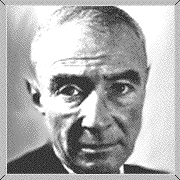 J.
Robert Oppenheimer,
was born in New York City on April 22, 1904. He graduated from
Harvard University in 1925. From there he traveled to Europe and
studied at Cambridge University. Finally, he received his doctoral
degree from the University of Gottingen in Germany.
J.
Robert Oppenheimer,
was born in New York City on April 22, 1904. He graduated from
Harvard University in 1925. From there he traveled to Europe and
studied at Cambridge University. Finally, he received his doctoral
degree from the University of Gottingen in Germany.
During his career he taught at the University of California, Berkeley and at the California Institute of Technology in Pasadena, California. During World War II, Oppenheimer worked on the Manhattan Project which produced the world's first atomic bomb. His work involved establishing a chain reaction with uranium 235 or plutonium with fast neutrons.
After the war he moved to Princeton, New Jersey and became the director of the Institute for Advanced Study. He served as the chairman of the board of scientific advisors of the Atomic Energy Commission in 1952. In 1953 he was denied a government security clearance because of his strong stance against nuclear weapons.
Oppenheimer was presented with the Fermi Award later in his career. J. Robert Oppenheimer died on February 18, 1967.
References
Asimov, I. (1964). Asimov's Biographical Encyclopedia of Science and Technology: The Living Stories of More than 1000 Great Scientists from the Age of Greece to the Space Age Chronologically Arranged. Garden City, NY: Doubleday.
Daintith, J., Mitchell, S., & Tootill, E. (1981). A Biographical Encyclopedia of Scientists. New York: Facts on File.
Howard, A.V. (1951). Chamber's Dictionary of Scientists. London: Chambers.
Ireland, N.O. (1962). Index to Scientists of the World, from Ancient to Modern Times: Biographies and Portraits. Boston, MA: Faxon.
McGraw-Hill (1966). McGraw-Hill Modern Men of Science. New York: McGraw-Hill.